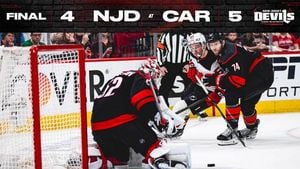TSV 1860 Munich is at a crossroads with its historic home, Grünwalder Stadion. Amid heated discussions surrounding its future, city representatives and club officials are grappling with the dual horses of nostalgia and progress. The call for action is urgent as estimated renovation costs reach up to €100 million, and the outcomes may define the fate of this iconic venue.
Sportbürgermeisterin Verena Dietl recently chimed in during the vibrant debate fueled by Munich’s Oberbürgermeister Dieter Reiter and Löwen-Präsident Robert Reisinger. Expressing her sentiment, she referred to the Grünwalder as “a cult location, the playing ground, and also the home of TSV 1860.” Dietl aligned herself with the notion of preserving the stadium’s legacy, emphasizing its importance within the club's community.
While Reiter and Reisinger have publicly ventured arguments about the stadium’s future, little new information has surfaced. Dietl mentioned the potential options: “We can renovate it cost-effectively; this, of course, isn’t what the Löwen prefer. The stakeholders have the power to choose whether the stadium is renovated according to their proposals or if the city implements the economical variant.” She firmly stated her preference for keeping the stadium as the Löwen's home, acknowledging the deep ties the club shares with Giesing, as clearly signified by fans with their recent banners.
On the other hand, discussions have emerged concerning the possible use of Olympiastadion as a temporary venue. Dietl expressed her surprise about Reiter's suggestion of this option, pointing out the Olympiastadion's current renovations: “It is astonishing if, before the first shovel hits the ground, speculations about construction plans, rents, or using the Olympiastadion as a fallback arise... This speculation doesn’t help resolve conflicts at 1860.”
The city’s tactics appear to be demanding unity and clarity from TSV 1860; Reiter called for decisive communication from the club leadership. His expectations hinge upon the club providing coherent guidance as to whether they desire to renovate their existing home or pursue alternate stadium plans.
“Löwen, please decide!” urged Reiter, stressing the need for teamwork among the board members, management, and investor Hasan Ismaik. This collaborative effort is seen as imperative to crafting credible long-term proposals. Without it, he cautioned, renovation efforts might be limited to the barest necessities, sidelining enhancements like business seats and extended capacity.
Interestingly, as if to intensify the dialogue, Hasan Ismaik himself weighed in. He bluntly asserted, “Concerning the Grünwalder Stadium, I have always emphasized... renovating the stadium is not relevant for us.” His message was clear: the financial burden of €80 million could be utilized to construct new facilities, rather than endlessly paying rent.
Ismaik credited Reiter for his engagement, hoping for alternative options for a new stadium site. Yet, there’s palpable skepticism about whether managing the finances to fund such substantial renovations or new construction can be achieved. After all, history has revealed the issues the club has faced with mounting expenses and previous financial mismanagement.
The stadium question has now become one of priority, with time ticking down. Reiter highlighted the urgency for the club's leadership to solidify its plans, stating during an interview, “I need clarity and unity on what direction TSV 1860 intends to go. It’s necessary for our future investments.”
With city elections approaching, potential leadership changes inside TSV 1860 could complicate discussions even more. Speculation is rampant about the future of current officials, including President Robert Reisinger, who may not seek reelection. Compounding the uncertainty, the club has yet to appoint a commercial director who seems indispensable for managing negotiations with the city's officials effectively.
Still, one thing is clear amid this chaos: there lies significant pressure for resolution. The juxtaposition between club loyalty and financial viability has undertaken far-reaching consequences for fans and stakeholders alike. Will the storied Grünwalder Stadium retain its status as home for TSV 1860, or will plans shift toward new horizons altogether?
With both municipal and club leaders indicating the potential for expansive agreements—or taking the other route with minimal updates—the outcome remains shrouded. One sentiment is widely echoed: stalemate must give way to resolution. Otherwise, Giesing could forever change, leaving fans reminiscing about their beloved stadium from the sidelines.
The road forward will depend critically on the collective strength of TSV 1860's leadership and its commitment to balancing heritage with modern demands.



